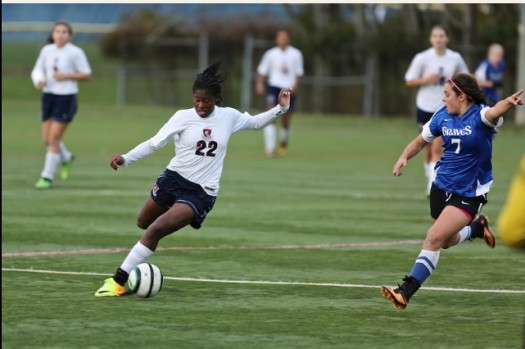LeBolt: Should your kid be a specialist, or general practitioner?
 To specialize or not to specialize, that is the question on many minds of late.
To specialize or not to specialize, that is the question on many minds of late.
Even most “non-proponents” of early specialization agree that if your kid is really serious about soccer, they need to choose it as a focus once they hit their teens or certainly by high school age. By then, they have had ample opportunity to try on other sports and other activities and can make a reasonably informed decision. But the pressure to specialize, or at least stick with one sport year-round, may start at 7 or 8 years of age. Can this be healthy?
Recreational Sports: Play for Discovery and Fun
Our youngest children should be exposed to many activities. These might include: sports, scouts, music and arts, languages, diversity, and anything else that will round out their educational and developmental experience. They are discovering stuff, mostly themselves. They are looking for what they’re good at, what’s fun, what’s interesting, and where their friends are.
The Recreation to Competitive Transition: Play with a Purpose
Where we start to get push-back on the “specialization” issue is at the next stage; I’ll call it the “competitive level.” This is the space where the young psyche and the parent chauffeur are still in the “diversify” mindset, but excellence starts to stand out and be recognized. If I’m athletically inclined, multiple teams and multiple coaches all encourage me to keep my options open. So I do. And instead of selecting activities, I layer them. I rush from school to basketball to soccer to scouts and, yawn, home to homework. I yearn to do each thing with absolute excellence, but it’s chipping away at me.
When this begins to happen, we’ve got to help kids narrow their options. Mind you, be cautious about letting the coaches do the narrowing here. If they see potential in this kid, of course, they are going to advocate for their own sport, and that’s as it should be, provided there isn’t undue pressure. But they don’t have the whole picture of the kid, they just have the snapshot. The big picture is the parent’s job.
+READ: How the business of youth soccer changed the player-coach relationship
At this stage, Mom and Dad have to take on the role of the family doctor or the general practitioner. Do you remember him?  The doctor who knew all about your medical history, your family dynamic, your siblings ages and college choices, maybe even where your parents went to school. He could take the very broad view of your care and give you welcome and honest advice about keeping things balanced. You trusted him.
The doctor who knew all about your medical history, your family dynamic, your siblings ages and college choices, maybe even where your parents went to school. He could take the very broad view of your care and give you welcome and honest advice about keeping things balanced. You trusted him.
Today, the family doctor is vanishing in favor of the specialist. Because, after we have Googled exactly what we have wrong with us, we just need a referral so we can be off to see the cardiologist or the neurologist or the endocrinologist. What can a general practitioner tell us that Google can’t after all?
So, in this era celebrating an array of specialists that passes itself off as diversification, we instead consult Google Maps for the quickest route from one activity to the next. Who has time to consider the health of it all?
Parents and coaches of competitive, not yet “select,” athletes need to be more Marcus Welby-ish. We need to be health care providers for these kids. Where medicine today is about “patient-focused care,” parenting and coaching today must be about player-focused-care.
Here’s the medical chart:
- Time, energy and money invested in ALL activities.
- How much sleep are they getting?
- How is their diet?
- What is their stress level? Energy level? Are they enjoying what they’re doing?
- How is it impacting the family? other siblings?
The Competitive to Select Transition: Play with a Passion
If they show a particular aptitude and interest and get offered a spot on the select team, why not give it a try? (They can always return to recreational play for fun!) But with selection must come de-selection of other activities in order to maintain the eating, sleeping, homework, stress level, family-sanity balance.
Keeping AAU basketball because “cross-training is good for them” is, at best, uninformed and at worst, irresponsible. Just doing another sport will not necessarily offer respite from their primary sport. If similar demands are made on their bodies (ie. running, cutting, jumping and landing), their joints may be at even great risk of overuse injury. All this comes at the expense of time better spent resting, recovering or on other activities that would actually broaden the spectrum.
If the soccer coach really likes what basketball is teaching them about vision and decision-making for soccer, then continuing with both can be an option. But substitute, don’t just ADD. The soccer coach invested in player-focused care should be willing to allow a sharing of time between the two sports. Not a “sure you can play basketball, just don’t be late for one of MY practices” but a swap. If that creates issues, then a red flag should run right up that flag pole.
And by share I don’t mean playing the first half here and then dashing across town or state to catch the second half elsewhere. The rushing from one thing to another may even double or triple the mental demands and physical exhaustion experienced by the kid as they try to shift gears, switching uniforms and somehow getting food and water choked down between math problems in the car.
+READ: Effort Injuries are Taking Kids Out: is “positive” parenting to blame?
If these kids are the future of youth soccer in America, the select team coach does have a huge responsibility. He or she has to be today’s Marcus Welby, Md., a trusted advisor, tuned into each kid personally in order to keep them healthy. The coach must ably quarterback all the facets of training in all their sport. This way, all the kid needs to do is put out maximal effort.
 College and professional coaches have it easy on this one. They can outsource to support staff the delivery of physiology, nutrition, psychology and athletic training services. The youth select coach is tasked with knowing enough about each of these to deliver them all himself. That’s a tall order. (That’s what I tackle in my book.)
College and professional coaches have it easy on this one. They can outsource to support staff the delivery of physiology, nutrition, psychology and athletic training services. The youth select coach is tasked with knowing enough about each of these to deliver them all himself. That’s a tall order. (That’s what I tackle in my book.)
So, do I support diverse play? Absolutely. Do I support specialization? Absolutely, as long as it’s done with knowledgeable player-focused care. But in an American culture that idolizes and pays top dollar to the specialist, it’s small wonder that we feel the temptation to specialize early in our youth sports.
It’s a trend that may land us in our doctor’s office. Marcus Welby, Md., where are you when we need you?
SOCCERWIRE MARKETPLACE
- visitRaleigh.com Showcase Series 2025, hosted by NCFC Youth
- OFFICIAL MANCHESTER CITY SOCCER CAMPS
- Wanted Licensed Youth Soccer Coach
- Join Official Elite Summer Soccer Camps with Europe’s Top Pro Clubs!
- The St. James FC Travel Staff Coach - North (Loudoun) & South (Fairfax)
- The St. James FC Girls Academy (GA) Head Coach - 2 teams
- The St James FC Boys Travel Tryouts
- OFFICIAL BAYERN MUNICH SUMMER CAMPS U.S.
- JOIN THE ALLIANCE!
- OFFICIAL FC BARCELONA CAMPS U.S.











